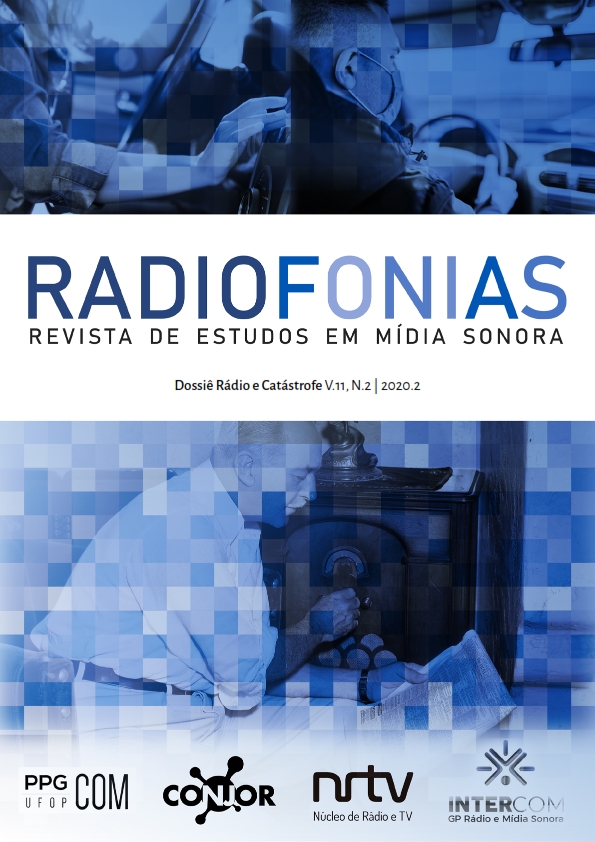Broadcasting the COVID-19 Pandemic in Central Africa
A Content Analysis of a United Nations Peacekeeping Radio
Resumen
La radio desempeña un papel fundamental en el continente africano en áreas donde hay una débil infraestructura, bajas tasas de alfabetización y pobreza endémica. Ante la crisis actual por la pandemia del COVID-19, se hace oportuno analizar el rol de un medio de comunicación como la radio Guira FM en la República Centroafricana. A través de un desglose de códigos, palabras clave y encuadres, este estudio adentró al contenido noticioso producido por periodistas de como este medio de comunicación hizo para responder a la crisis sanitaria. El estudio discute los desafíos de hacer radio en una sociedad en transición bajo una misión de paz de las Naciones Unidas (ONU) y revela una dinámica de esfuerzos para contrarrestar esta amenaza global. Además, analiza el concepto de comunicación de riesgo y problematiza las implicaciones de una radio administrada por la ONU con el fin de evaluar su papel en el servicio público de comunicación.
Citas
BECK, U. Risk society: towards a new modernity. London ; Newbury Park, Calif: Sage Publications, 1992.
BECK, U. Living in the world risk society: A Hobhouse Memorial Public Lecture given on Wednesday 15 February 2006 at the London School of Economics. Economy and Society, v. 35, n. 3, p. 329–345, ago. 2006.
BETZ, M. Capacity-building, institutional change and theories of change : Creating an enabling environment for journalists in post-conflict environments. In: HOFFMANN, JULIA; HAWKINGS, VIRGIL (Eds.). . Communication and Peace: Mapping an emerging field. NY: Routledge, 2015. p. 219–232.
BOUTROS BOUTROS GHALI. An Agenda for Peace: Preventive diplomacy, peacemaking and peace-keeping: Report of the Secretary-General. Disponível em:
BURES, O. Wanted: A Mid-Range Theory of International Peacekeeping. International Studies Review, v. 9, n. 3, p. 407–436, 2007.
CHENG, V. C. C. et al. Severe Acute Respiratory Syndrome Coronavirus as an Agent of Emerging and Reemerging Infection. Clinical Microbiology Reviews, v. 20, n. 4, p. 660–694, out. 2007.
DW. Central African Republic in disarray after coup | DW | 25.03.2013. Disponível em:
ENTMAN, R. M. Framing: Toward Clarification of a Fractured Paradigm. Journal of Communication, v. 43, n. 4, p. 51–58, 1 dez. 1993.
ERICSON, R. V.; BARANEK, P. M.; CHAN, J. B. L. Representing order: crime, law, and justice in the news media. Milton Keynes: Open University Press, 1991.
FRÈRE, M.-S.; MARTHOZ, J.-P. The media and conflicts in Central Africa. Boulder, Colo: Lynne Reinner Publishers, 2007.
HANSEN, A.; MACHIN, D. Media and communication research methods. Basingstoke, Hampshire: Palgrave Macmillan, 2013.
HOBFOLL, S. E. et al. Five Essential Elements of Immediate and Mid–Term Mass Trauma Intervention: Empirical Evidence. Psychiatry: Interpersonal and Biological Processes, v. 70, n. 4, p. 283–315, dez. 2007.
HOWARD, L. Power in Peacekeeping. 1. ed. [s.l.] Cambridge University Press, 2019.
HUGELIUS, K.; ADAMS, M.; ROMO-MURPHY, E. The Power of Radio to Promote Health and Resilience in Natural Disasters: A Review. International Journal of Environmental Research and Public Health, v. 16, n. 14, p. 2526, 15 jul. 2019.
ISS. How rebels became kingmakers in the Central African Republic. Disponível em:
KÄIHKÖ, I.; UTAS, M. The Crisis in CAR: Navigating Myths and Interests. Africa Spectrum, v. 49, n. 1, p. 69–77, 2014.
KARP, I. Agency and Social Theory: A Review of Anthony Giddens. American Ethnologist, v. 13, n. 1, p. 131–137, 1986.
LATOUR, B. On technical mediation—philosophy, sociology, genealogy. Common Knowledge, v. 3, n. 2, p. 29–64, 1994.
LATOUR, B. On actor-network theory: A few clarifications. Soziale Welt, v. 47, n. 4, p. 369–381, 1996.
LATOUR, B. Reassembling the social: an introduction to Actor-Network-Theory. Oxford: Oxford Univ. Press, 2007.
LEHMANN, I. A. Peacekeeping and Public Information: Caught in the Crossfire. 1. ed. [s.l.] Routledge, 1999.
LEISS, W. Effective risk communication practice. Toxicology Letters, v. 149, n. 1–3, p. 399–404, 1 abr. 2004.
LUNDGREN, R. E.; MCMAKIN, A. H. Risk communication: a handbook for communicating environmental, safety, and health risks. Sixth edition ed. Hoboken, New Jersey: IEEE Press : Wiley, 2018.
MACLEAN, R.; MARKS, S. 10 African Countries Have No Ventilators. That’s Only Part of the Problem. The New York Times, 18 abr. 2020.
MCINNES, C.; ROEMER-MAHLER, A. From security to risk: reframing global health threats. International Affairs, v. 93, n. 6, p. 1313–1337, 1 nov. 2017.
MINISTÈRE DE LA SANTÉ ET DE LA POPULATION. Rapport de Situation Journaliere de Covid-19 en Republique Centrafricaine. Disponível em:
MINUSCA. Guira FM. Disponível em:
MINUSCA. Guira FM. Disponível em:
NEUWIRTH, KURT. ‘Risk, Crisis, and Mediated Communication’ (Chapter 20). In: Handbook of Risk and Crisis Communication. Robert L. Heath, and H. Dan O’Hair (ed) ed. [s.l.] Taylor & Francis Group, 2008. p. 398–411.
NIHLÉN FAHLQUIST, J. Moral responsibility and risk in society: examples from emerging technologies, public health and environment. London ; New York: Routledge, Taylor & Francis Group, 2019.
NORDLING, L.; PM, 7:00. ‘A ticking time bomb’: Scientists worry about coronavirus spread in Africa. Disponível em:
NRC. Just three ventilators to cope with Covid-19 in Central African Republic. Disponível em:
ORME, W. ‘Broadcasting in UN Blue: The Unexamined Past and Uncertain Future of Peacekeeping Radio’, Center for International Media Assistance (CIMA). US: CIMA, 16 fev. 2010. Disponível em:
POWELL, D. A.; LEISS, W. Mad cows and mother’s milk: the perils of poor risk communication. Montreal: McGill-Queen’s University Press, 1997.
RAMSBOTHAM, O.; WOODHOUSE, T. Encyclopedia of international peacekeeping operations. Santa Barbara, Calif: ABC-CLIO, 1999.
SADATI, A. K.; B LANKARANI, M. H.; BAGHERI LANKARANI, K. Risk Society, Global Vulnerability and Fragile Resilience; Sociological View on the Coronavirus Outbreak. Shiraz E-Medical Journal, v. In Press, n. In Press, 7 mar. 2020.
UN. United Nations Peacekeeping Operations: Principles and Guidelines. NY: United Nations Department of Peace Keeping Operation, 2008. Disponível em:
UNESCO. International Charter of Physical Education, Physical Activity and Sport. Disponível em:
UNSCR. Security Council Resolution 2149 - UNSCR. Disponível em:
WHO. Constitution of the World Health Organization.: Forty-fifth edition. [s.l.] WHO, out. 2006. Disponível em:
WHO. Central African Republic: a silent crisis. Disponível em:


